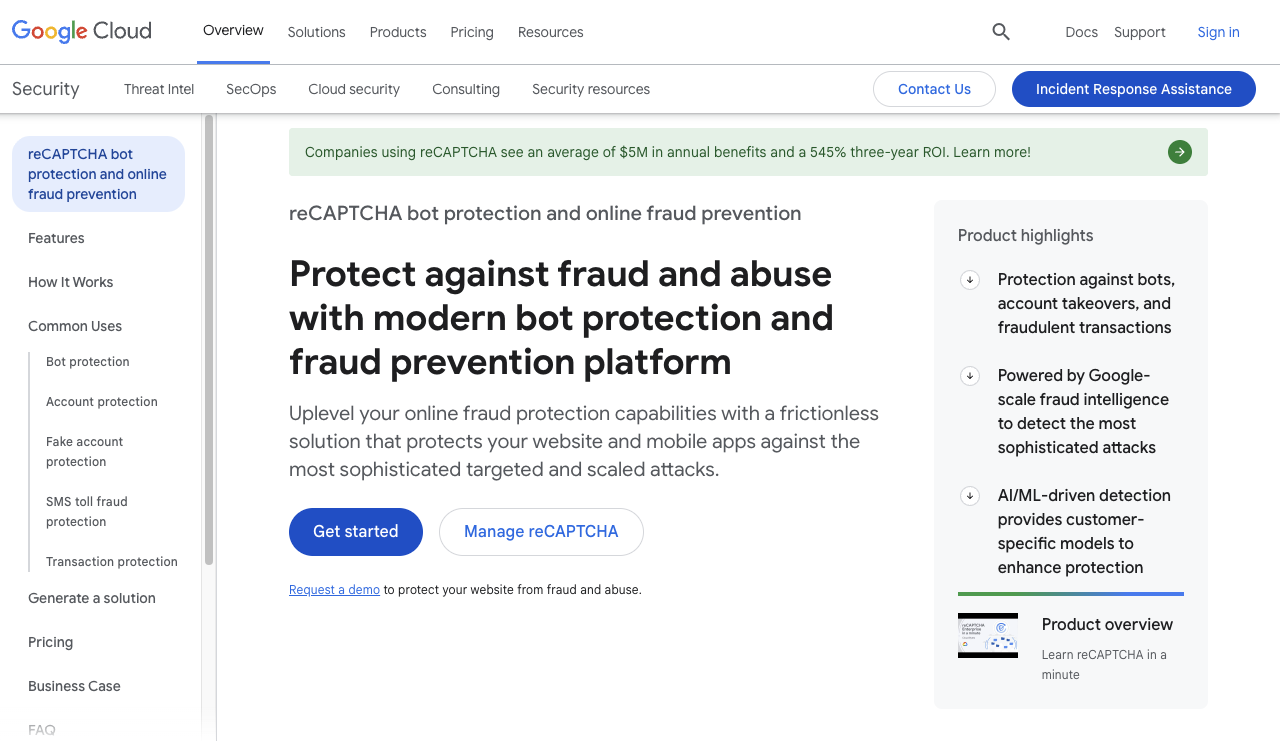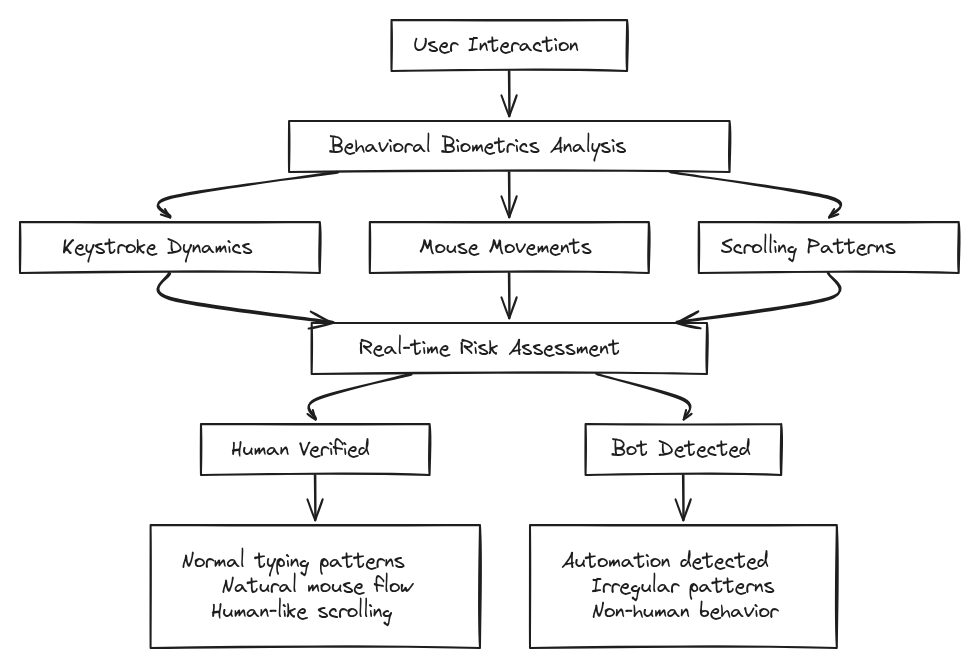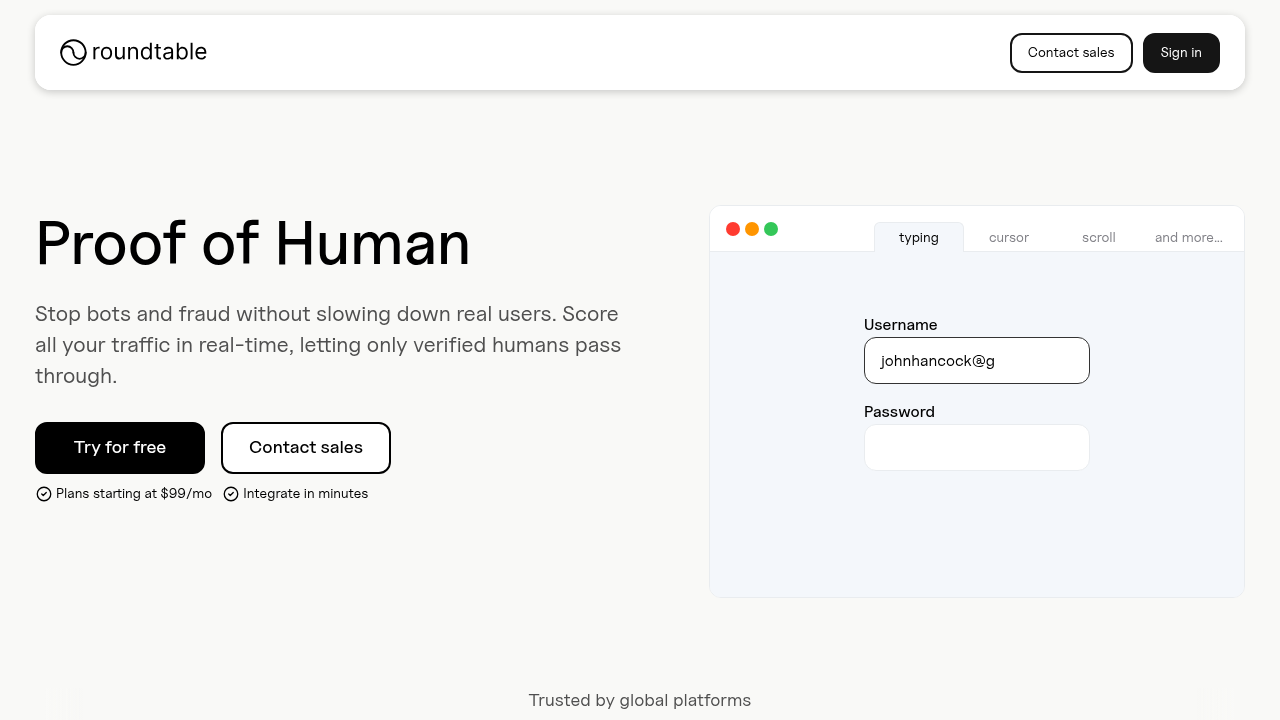10/03/2025. As bots get smarter traditional, CAPTCHAs get weaker—clicking on traffic lights isn't as effective as it once was. If you're looking at bot protection solutions, the choice between Google's reCAPTCHA and newer approaches like
Proof of Human matters more than ever. Your users deserve protection that works without the friction. In this post, I'll cover detection rates, privacy implications, and why behavioral analysis is replacing challenge-based verification in 2025.
TLDR:
- We've found Roundtable achieves 87% bot detection vs reCAPTCHA's 69% with zero user friction.
- reCAPTCHA has faced regulatory scrutiny under GDPR, including a CNIL ruling about excessive data collection.
- Roundtable gives you explainable results instead of opaque scores for security decisions.
- Behavioral biometrics detects bots that easily bypass traditional challenge systems.
- Integration takes minutes with a one-line API vs a more complex CAPTCHA setup.
What is reCAPTCHA and How Does it Work?
reCAPTCHA is Google's bot detection service and has significantly evolved since its early days of distorted text challenges. The original reCAPTCHA v1 forced every user to decipher warped letters and numbers, creating universal friction and annoyance for all website visitors.
reCAPTCHA v3 is Google's attempt at invisible bot detection. Instead of presenting challenges, it analyzes user behavior patterns and browsing history across Google services to generate risk scores between 0.0 (likely bot) and 1.0 (likely human).
The invisible version operates in the background, monitoring user interactions and using Google's vast data ecosystem to make determinations about user authenticity. When the confidence levels drop below certain thresholds, the system can fall back to visual challenges.
However, this approach creates dependencies on Google's tracking infrastructure and requires websites to make decisions based on an opaque scoring system that offers little explanation for their assessments.
What is Roundtable and Our Approach?
Roundtable provides an invisible, continuous bot detection solution called "Proof of Human" that analyzes behavioral patterns to instantly distinguish real users from bots without any friction. Our API uses behavioral biometrics and cognitive science research to verify human identity in real time.
Unlike traditional approaches that rely on challenges or external data sources,
Roundtable continuously monitors behavioral biometrics like keystroke dynamics, mouse movements, and scrolling patterns. These subtle signals reveal the cognitive processes that distinguish human behavior from automated scripts.
The solution operates as a one-line API that integrates smoothly with websites through simple JavaScript implementation. Developers can add our tracking code and start receiving real-time risk assessments within minutes, without complex setup or configuration requirements.
Our approach focuses on privacy-preserving detection. We do not collect PII and we do not perform cross-site tracking. Proof of Human protects your system without collecting or storing sensitive user data, maintaining compliance and user trust.
Roundtable provides explainable results with natural language descriptions of why specific sessions receive high or low risk scores. Instead of opaque numerical ratings, security teams get clear insights like "abnormal typing cadence detected" or "mouse movement patterns consistent with automation."
This transparency allows informed decision-making and helps organizations understand their security posture while maintaining user privacy and regulatory compliance.
Modern bot detection faces unprecedented challenges as AI systems become increasingly sophisticated. For example, in September 2024,
researchers from ETH Zurich announced they had built an efficient AI model capable of defeating visual reCAPTCHAs 100% of the time.
| Solution |
Bot Detection Rate |
User Friction |
| Roundtable Proof of Human |
86.7% |
Low (Invisible) |
| Google reCAPTCHA v3 |
69.3% |
Low (Invisible) |
| hCaptcha Invisible |
64.7% |
Medium (occasional challenges) |
| FingerprintJS Pro |
36.0% |
Low (Invisible) |
| Cloudflare Turnstile |
33.3% |
Low (Invisible) |
Roundtable tackles these limitations through behavioral analysis that goes beyond simple device fingerprinting. Our system achieved the highest bot detection score in full testing, successfully identifying over 86% of bots across all tasks and automation types.
The effectiveness gap stems from fundamental differences in detection approaches. While reCAPTCHA v3 relies primarily on risk scoring based on user behavior tracking across Google services, it struggles against sophisticated automation that can forge fingerprints and perform complex tasks.
reCAPTCHA can easily detect naive bots that use unpatched Selenium drivers or fail to remove telltale automation attributes. However,
basic fingerprint spoofing easily bypasses reCAPTCHA v3 detection mechanisms.
By contrast, our behavioral biometrics approach captures the subtle cognitive signatures that are economically difficult for attackers to replicate at scale, providing stronger protection against evolving threats.
Privacy and Compliance Considerations
reCAPTCHA faces major privacy compliance challenges, particularly under GDPR regulations. The service's intensive data collection practices raise concerns about user privacy and regulatory compliance for websites implementing the solution.
CNIL, the French data protection authority, has officially determined that reCAPTCHA uses excessive personal data for purposes other than security, affecting the privacy of end-users who interact with websites using the service.
Key privacy concerns with reCAPTCHA include:
- Extensive data collection across Google services and partner websites
- Cross-site tracking through cookies and behavioral monitoring
- Data transfer to non-EU countries without adequate safeguards
- Lack of transparency regarding data usage and retention policies
reCAPTCHA collects and processes personal data including IP locations, browser information, and detailed user behavior through cookies and tracking technologies. This data collection requires explicit consent under GDPR and ePrivacy Directive requirements.
The compliance burden extends beyond the initial implementation, requiring ongoing privacy impact assessments and user consent management that many organizations struggle to maintain effectively.
Roundtable takes a different approach to privacy. Our solution operates without cookies or cross-site tracking, collecting only behavioral signals necessary for bot detection during active sessions. This approach provides transparent, explainable results without creating privacy compliance burdens for website operators or requiring complex consent mechanisms.
User Experience and False Positives
User experience represents a critical differentiator between bot detection approaches. High false positive rates, especially affecting vulnerable populations and international users, make threshold-based exclusions problematic with traditional systems.
reCAPTCHA creates friction through challenges and accessibility barriers that can exclude legitimate users. Even when operating invisibly, the system frequently falls back to visual challenges when confidence scores drop below acceptable thresholds.
Research shows that reCAPTCHA challenges can be particularly problematic for users with disabilities, older adults, and international visitors who may struggle with image recognition tasks or cultural context requirements.
The accessibility concerns extend beyond individual user frustration. Organizations implementing reCAPTCHA may inadvertently create barriers that violate accessibility compliance requirements and exclude potential customers or users.
Roundtable eliminates this friction entirely through continuous, invisible verification. Users never encounter challenges or interruptions while legitimate traffic flows through unimpeded with an average false positive ratio of just 0.01%.
Our solution provides natural language explanations for risk decisions, allowing transparent security operations without creating user experience degradation or accessibility barriers.
FAQ
How quickly can I integrate Roundtable compared to reCAPTCHA?
Roundtable integrates as a one-line API that can be implemented in minutes with simple JavaScript. By contrast, reCAPTCHA requires more complex setup including Google account configuration, key management, and ongoing compliance and security considerations.
What makes behavioral biometrics more effective than traditional CAPTCHA challenges?
Behavioral biometrics analyze subtle patterns like keystroke dynamics and mouse movements that are economically difficult for bots to replicate at scale, while visual challenges can now be solved by modern AI with 100% accuracy according to recent research.
Can I use Roundtable without worrying about GDPR compliance issues?
Yes, Roundtable operates without cookies, cross-site tracking, or PII collection, eliminating the privacy compliance burdens that affect reCAPTCHA users under GDPR and other data protection regulations.
How do I know why a user was flagged as a bot?
Roundtable provides explainable results with natural language descriptions like "abnormal typing cadence detected," while reCAPTCHA v3 only offers opaque numerical scores between 0.0 and 1.0 without any explanation.
What's the false positive rate difference between the two solutions?
Roundtable maintains a 0.01% false positive rate with no user friction, while reCAPTCHA's variable false positive rates often trigger visual challenges that can exclude legitimate users, particularly those with disabilities or international visitors.
Final thoughts on choosing effective bot protection
The gap between old-school challenge systems and modern threats keeps widening as bots get smarter. Your security decisions shouldn't rely on outdated methods that frustrate real users while missing sophisticated attacks.
Roundtable offers a straightforward path to better protection without privacy headaches or user friction. The data speaks for itself as to what works best in today's threat environment.



